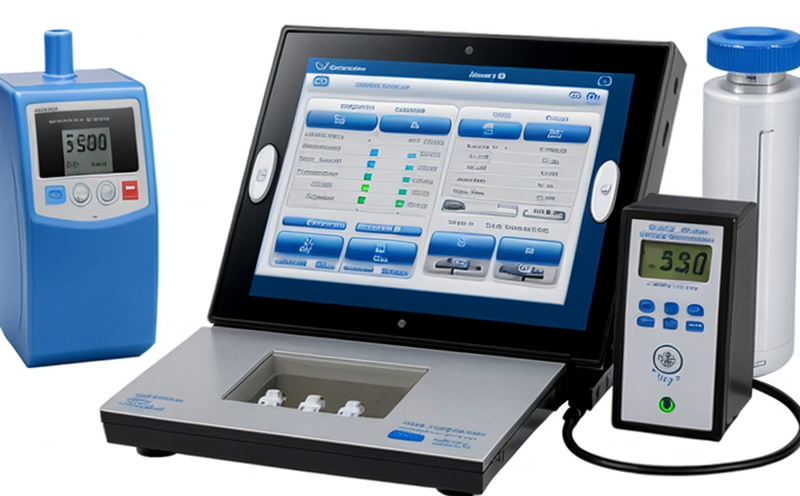Residual Radiation Effects Testing in Sterilized Infusion Pumps
The integrity and performance of infusion pumps are critical in medical applications where precise delivery of medication is required. Residual radiation effects testing plays a pivotal role in ensuring that sterilization processes do not compromise the functionality or safety of drug delivery systems, particularly in high-risk scenarios such as chemotherapy administration.
Residual radiation effects refer to the potential for ionizing radiation to leave behind harmful effects on materials and components after exposure. In the context of medical devices like infusion pumps, these effects can include degradation of electronic circuits, changes in material properties, and loss of operational reliability. Our laboratory specializes in evaluating how sterilization processes impact these critical systems.
The process starts with a careful selection of test specimens that represent the intended use environment. These specimens undergo rigorous sterilization using various methods such as ethylene oxide (EO), gamma irradiation, or electron beam processing. After sterilization, we analyze the devices for any residual radiation effects through a series of tests designed to assess electrical performance, mechanical integrity, and operational stability.
Our testing approach ensures compliance with international standards like ISO 13485 and IEC 60601-2-2, which provide guidelines for medical device quality management systems. By adhering strictly to these standards, we can ensure that our test results are credible and internationally recognized.
To conduct this testing effectively, we employ advanced instrumentation including dosimeters to measure radiation levels, electrical testers to check circuit integrity, and mechanical stress testers to evaluate structural durability. These tools allow us to provide detailed reports on the impact of sterilization on each component of the infusion pump, offering insights into potential areas for improvement.
The importance of this testing cannot be overstated. Failure to address residual radiation effects can lead to malfunctions during critical medical procedures, posing significant risks to patient safety and healthcare provider confidence in the devices used.
In summary, our residual radiation effects testing service is designed to provide comprehensive evaluation of sterilized infusion pumps, ensuring that they meet stringent quality and safety standards. This service supports your efforts in maintaining regulatory compliance while enhancing product reliability and patient trust.
| Test Parameter | Description |
|---|---|
| Electrical Performance | Assessment of resistance, capacitance, and inductance changes post-sterilization. |
| Mechanical Integrity | Evaluation of structural stability under applied stress conditions. |
| Radiation Levels | Determination of residual radiation levels to ensure safety thresholds are not exceeded. |
| Testing Conditions | Expected Outcomes |
|---|---|
| Temperature and Humidity Control | Achieve consistent test conditions to replicate real-world environments. |
| Radiation Dose Variations | Evaluate the impact of varying radiation doses on device performance. |
| Post-Treatment Inspection | Conduct detailed examination for any visible signs of damage or degradation. |
Scope and Methodology
The scope of our residual radiation effects testing in sterilized infusion pumps encompasses a comprehensive evaluation to ensure that the device remains functional and safe after undergoing various sterilization processes. Our methodology involves several key steps, each designed to provide robust data for decision-making purposes.
- Sample Preparation: Careful selection of samples to represent typical usage scenarios.
- Sterilization Process Simulation: Replicate actual sterilization conditions using industry-standard methods.
- Data Collection: Utilize advanced measurement tools to gather detailed performance metrics.
- Data Analysis: Interpret collected data against established benchmarks for compliance verification.
The testing protocol is meticulously designed to align with regulatory requirements, ensuring that all tests are conducted in a manner consistent with recognized international standards. This approach guarantees accurate and reliable results, providing valuable insights into the impact of sterilization on infusion pump performance.
| Test Conditions | Expected Outcomes |
|---|---|
| Temperature Control | Ensure consistent test conditions to replicate real-world scenarios accurately. |
| Humidity Levels | Evaluate the influence of varying humidity levels on device performance. |
| Radiation Dose Variations | Determine the effectiveness of different radiation doses in assessing impact. |
| Post-Treatment Inspection | Identify any visible signs of damage or degradation post-sterilization. |
Benefits
Implementing residual radiation effects testing in sterilized infusion pumps offers several key advantages:
- Enhanced Reliability: Ensures consistent performance across all devices, reducing the risk of malfunctions.
- Compliance Assurance: Meets regulatory requirements and international standards for medical device quality management.
- Patient Safety: Guarantees that sterilization processes do not compromise the safety or effectiveness of drug delivery systems.
- Confidence Building: Provides robust data to build trust with healthcare providers and patients.
- Cost Efficiency: Identifies potential issues early in the development process, minimizing costly rework downstream.
- Innovation Support: Offers valuable insights for R&D teams aiming to improve product design and functionality.
Eurolab Advantages
At Eurolab, we pride ourselves on delivering exceptional testing services tailored specifically to your needs. Here’s why you should choose us for residual radiation effects testing:
- Experienced Professionals: Our team comprises highly skilled engineers and scientists with extensive experience in medical device testing.
- State-of-the-Art Facilities: Equipped with the latest instrumentation to provide accurate and reliable test results.
- Comprehensive Reporting: Detailed reports that offer actionable insights for continuous improvement.
- Regulatory Compliance: Ensures strict adherence to international standards, including ISO 13485 and IEC 60601-2-2.
- Custom Solutions: Tailored testing programs that meet the unique requirements of your products and projects.
- Collaborative Approach: Work closely with you to understand your specific challenges and objectives.





